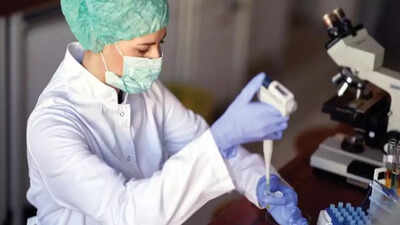Top Searches
- News
- City News
- Hyderabad News
- Covid spurt: Rigorous tests for patients with flu in Telangana
Covid spurt: Rigorous tests for patients with flu in Telangana

Representative image
HYDERABAD: The Telangana government has issued new operational guidelines to contain the spurt in Covid-19 cases, making it mandatory for patients walking into state-run hospitals and health centres with influenza-like symptoms or severe respiratory complaints to be tested for the virus.
This, officials said, would be strictly implemented in the backdrop of a steady rise in Covid cases in Telangana and neighbouring states. The number of tests that hovered between 12,000 and 15,000 was increased to over 22,000 on Tuesday. And testing will be raised further over the next few days, as per plan. Earlier, less than 50% of patients with such symptoms underwent tests.

Issuing the revised surveillance guidelines, the health department stated there was a need to enhance focus on early detection, isolation, testing and timely management of suspected and confirmed cases, while strengthening efforts to detect and contain outbreaks of new SARS-CoV-2 variants.
The fresh surveillance strategy has been disseminated to the field level.
"The state has handed out instructions to test all influenza-like illness and SARI (severe acute respiratory infection) symptomatic patients at the outpatient level at all primary health centres, urban primary health centres, basti dawakhanas, community health centres, area hospitals, district hospitals and teaching hospitals and send samples for RTPCR testing to rule out Covid infection," said an official.
As per revised Central protocols adopted by the state for international passengers, flyers touching down at Hyderabad will be randomly screened and positive samples sent for genomic sequencing. Those who test positive should undergo a 15-day quarantine.
Also, positive samples from large clusters or communities hit by an outbreak will be sent for genome sequencing. Sentinel surveillance at various levels, including laboratories, hospitals, sewerage and water samples will be initiated, as per Centre's directive.
"The present guidelines provide revised strategy for surveillance with focus on early detection, isolation, testing and timely management of suspect and confirmed cases; detect and contain outbreaks of new SARS-CoV-2 variants and monitor trends of existing variants," read the Central guidelines.
This, officials said, would be strictly implemented in the backdrop of a steady rise in Covid cases in Telangana and neighbouring states. The number of tests that hovered between 12,000 and 15,000 was increased to over 22,000 on Tuesday. And testing will be raised further over the next few days, as per plan. Earlier, less than 50% of patients with such symptoms underwent tests.

Issuing the revised surveillance guidelines, the health department stated there was a need to enhance focus on early detection, isolation, testing and timely management of suspected and confirmed cases, while strengthening efforts to detect and contain outbreaks of new SARS-CoV-2 variants.
The fresh surveillance strategy has been disseminated to the field level.
"The state has handed out instructions to test all influenza-like illness and SARI (severe acute respiratory infection) symptomatic patients at the outpatient level at all primary health centres, urban primary health centres, basti dawakhanas, community health centres, area hospitals, district hospitals and teaching hospitals and send samples for RTPCR testing to rule out Covid infection," said an official.
As per revised Central protocols adopted by the state for international passengers, flyers touching down at Hyderabad will be randomly screened and positive samples sent for genomic sequencing. Those who test positive should undergo a 15-day quarantine.
Also, positive samples from large clusters or communities hit by an outbreak will be sent for genome sequencing. Sentinel surveillance at various levels, including laboratories, hospitals, sewerage and water samples will be initiated, as per Centre's directive.
"The present guidelines provide revised strategy for surveillance with focus on early detection, isolation, testing and timely management of suspect and confirmed cases; detect and contain outbreaks of new SARS-CoV-2 variants and monitor trends of existing variants," read the Central guidelines.
FOLLOW US ON SOCIAL MEDIA
FacebookTwitterInstagramKOO APPYOUTUBE
Looking for Something?

Start a Conversation
end of article










